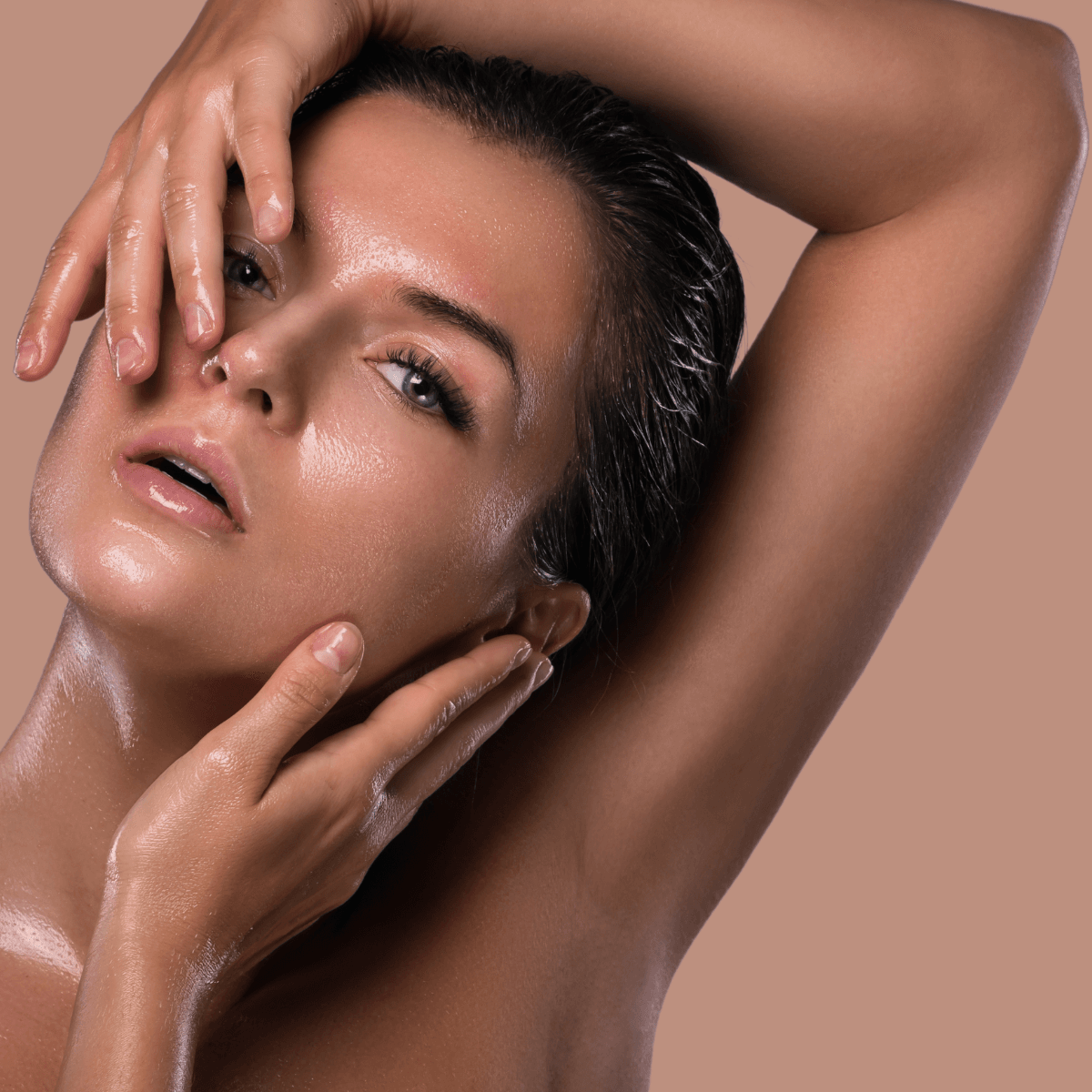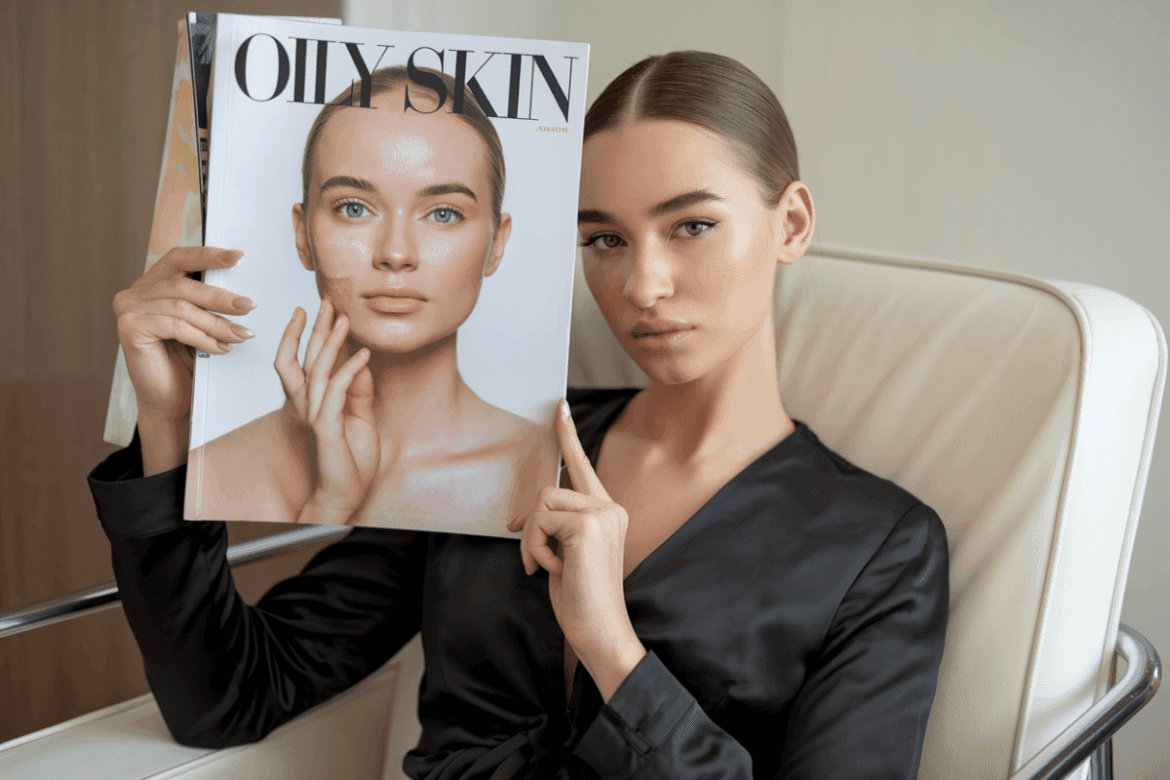Oily skin is a blessing and a curse. On one hand, that extra sebum helps keep skin naturally moisturized and can slow down visible signs of aging. On the other hand, it often comes with an unwanted sidekick – constant shine and enlarged pores that feel impossible to hide. If you’ve ever had your foundation slide off by noon or felt like your T-zone has a mind of its own, you’re not alone.
The good news? Managing oily skin isn’t about stripping it dry but about understanding what it needs. In this guide, we’ll break down why your skin gets oily in the first place and, more importantly, how to keep it balanced and shine-free without overdoing it.

Contents
Why Is My Skin So Oily? Understanding Sebum Overdrive
Before you can tame oily skin, you need to understand why it happens in the first place. Sebum, the natural oil your skin produces, isn’t the enemy – it’s your body’s way of keeping your skin hydrated and protected. But when your sebaceous glands go into overdrive, that’s when the problems start.
- Genetics play a huge role. If your parents have oily skin, chances are, you inherited it too. Some people naturally produce more oil than others due to their skin type, and there’s not much you can do to change that – except learn how to work with it.
- Hormones can wreak havoc on your skin. Ever noticed how your skin gets oilier around your period or during stressful weeks? Hormones like androgens stimulate sebum production, which is why teenagers and adults with hormonal imbalances often struggle with excessive oil.
- Your skincare routine might be making things worse. It’s tempting to attack oily skin with aggressive cleansers and alcohol-based toners, but over-cleansing actually triggers your skin to produce even more oil to compensate. Using the wrong products can make oily skin even shinier, not to mention irritated and breakout-prone.
- Environmental factors play a role too. Hot, humid weather makes your sebaceous glands work overtime, while cold, dry air can trick your skin into producing more oil to make up for the lack of moisture. Even indoor heating and air conditioning can throw your skin off balance.
Skincare Routine for Oily Skin: What Actually Works?
A solid skincare routine is your best weapon against excess oil and visible pores. But here’s the secret: oily skin doesn’t need to be stripped dry – it needs to be balanced.
Cleansing: Less is More
The goal of cleansing isn’t to remove every last trace of oil but to get rid of excess sebum, dirt, and bacteria without disrupting your skin barrier.
- Choose a gentle, sulfate-free cleanser. Gel-based or foaming cleansers with salicylic acid, niacinamide, or tea tree oil can help keep pores clear without overdrying your skin. Avoid anything that leaves your skin feeling tight – tight skin means your natural oils have been stripped, which leads to more oil production.
- Don’t wash your face more than twice a day. Over-cleansing can actually backfire, making your skin produce even more oil. If you feel greasy midday, try blotting papers instead of an extra cleanse.
Toning: Your Secret Weapon
Toners aren’t just fancy water – they help balance oil production and tighten the appearance of pores. Look for alcohol-free toners with ingredients like witch hazel, niacinamide, or green tea. These ingredients help control oil without dehydrating your skin. A gentle exfoliating toner with AHAs or BHAs can also do wonders. A few times a week, using a toner with glycolic or salicylic acid can help keep pores unclogged and minimize shine over time.
Moisturizing: Yes, Oily Skin Needs It Too!
Skipping moisturizer is one of the biggest mistakes people with oily skin make. When your skin lacks hydration, it compensates by producing even more oil.
Opt for lightweight, oil-free moisturizers. Look for water-based or gel formulas with ingredients like hyaluronic acid, glycerin, or aloe vera. These provide hydration without making your skin greasy. Some moisturizers contain oil-absorbing ingredients like silica or clay that help control shine throughout the day.
Sun Protection: Don’t Skip SPF!
Sunscreen is non-negotiable, even for oily skin. The key is choosing the right formula. Go for a lightweight, non-comedogenic SPF. Gel-based or mattifying sunscreens won’t clog your pores or add extra shine.
Mineral sunscreens with zinc oxide can actually help control oil. Unlike chemical sunscreens, zinc oxide has anti-inflammatory properties that help calm breakouts and reduce excess sebum.
How to Minimize Enlarged Pores
The bad news? You can’t actually shrink your pores. The good news? You can make them look smaller with the right skincare and treatments.
- Niacinamide is your best friend. This powerhouse ingredient helps regulate oil production, improve skin texture, and tighten the appearance of pores over time.
- Retinol can work magic. By increasing cell turnover, retinol helps keep pores clear and makes skin look smoother and more refined.
- Professional treatments can help. Chemical peels, laser treatments, and microneedling can significantly reduce the appearance of large pores when done regularly.

Makeup Tips for Oily Skin
Oily skin and makeup don’t always get along, but the right techniques can make all the difference.
- Start with a mattifying primer. A good primer creates a smooth base and helps absorb excess oil before it ruins your foundation.
- Choose the right foundation. Oil-free, long-wear, and powder-based foundations tend to perform best on oily skin. Avoid anything with a dewy finish – it will only enhance shine.
- Set everything in place. A light dusting of translucent powder, followed by a setting spray, helps lock in your look and prevent midday breakdowns.
Lifestyle and Diet Adjustments for Better Skin
What you put in your body affects your skin just as much as what you put on it.
- Diet matters. Reducing processed foods, sugar, and dairy can help control oil production and prevent breakouts. Foods rich in antioxidants, like berries, green tea, and leafy greens, can help keep skin balanced.
- Stay hydrated. Dehydrated skin can actually produce more oil to compensate. Drinking enough water keeps everything in check.
- Manage stress levels. Stress triggers cortisol production, which can lead to more oil and more breakouts. Regular exercise, good sleep, and mindfulness practices can help keep your skin calm and happy.
And remember, oily skin isn’t a curse – it just needs the right balance of care and attention. The key is to work with your skin, not against it. A solid skincare routine, strategic makeup choices, and healthy lifestyle habits can keep shine under control and your complexion looking smooth and flawless.


